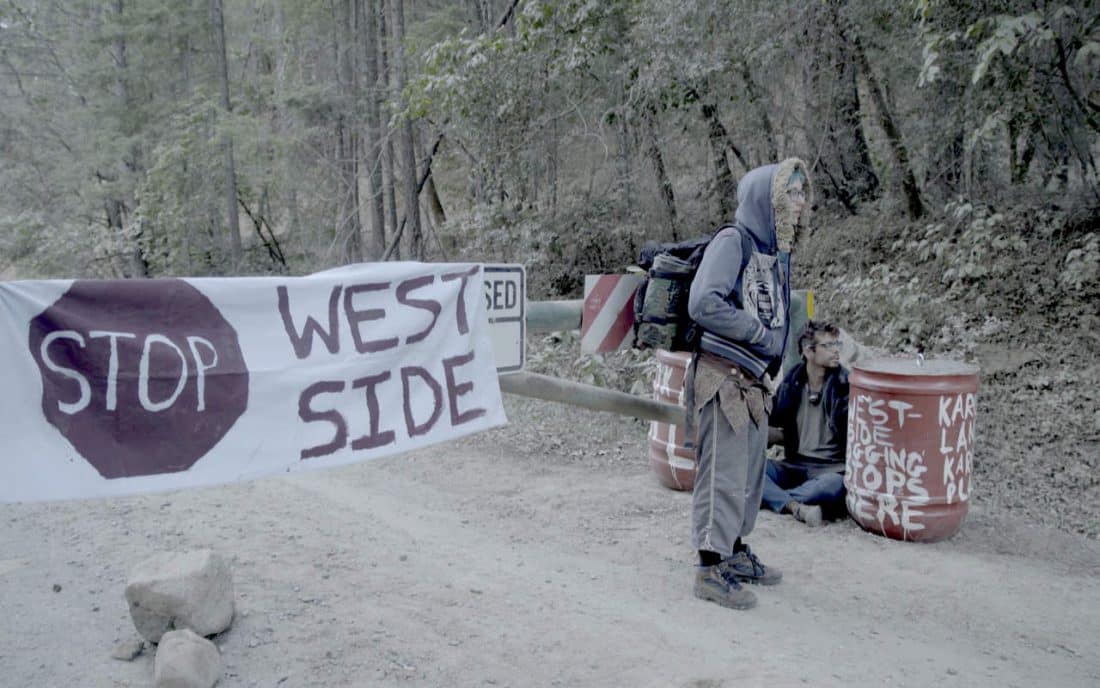Three forest activists arrested during civil disobedience protests in the Klamath region of Northern California will be represented by attorneys from the Civil Liberties Defense Center in federal court this fall. The case comes after an effective and peaceful “barrel blockade” halted logging operations and elevated an ongoing campaign to expose the Westside “Salvage” Logging Project as an illegal and destructive plan, and instead promote a popular restoration alternative proposed for the region, as put forward by the Karuk Tribe.
On-the-ground advocacy for the threatened region became impossible after the protest, because of the deployment of teams of federal Law Enforcement Officers, who were sent to enforce a sweeping Forest Closure Area for miles of roads and trail systems in the Klamath National Forest. In addition, on August 27, the Gap wildfire sparked in forests directly adjacent to the logging operations and resulted in the closure of additional trail systems, highways and other access routes until its containment September 19.
At writing, clear-cut logging, road building and hauling continues for many timber sales within the Westside Project, located in a remote mountains of the Klamath National Forest, while oral arguments in the legal challenge led by the Karuk Tribe is scheduled to be heard November 17. At the heart of the legal claims is the allegation that road building and logging operations in Westside timber sales will cause irreversible harm to at-risk salmon and communities dependent on the Klamath River.
If completed, the project will clear cut log more than 5700 acres of forests previously set aside from harvest and will remove trees along 320 miles of roads. According to Forest Service analysis, the project is likely to adversely affect more than 55 Northern Spotted Owl activity centers, and destroy several significant bald eagle nests. Most of the logging units are situated along on steep, erosive hillsides directly above salmon-bearing rivers and streams, creating hazardous conditions for threatened fish species and could even result in a localized extinction of Klamath coho salmon.
In addition to threats to cultural resources, fish and wildlife, project opponents have expressed outrage at the Forest Service subsidies to logging companies, after several timber sales sold for as little as $2.50 per log truck load. The subsidies were offered after most of the timber sales failed to sell and were re-offered at the discounted rates.
The road blockade in early August came on the heels of several dynamic protest actions and unprecedented public involvement in local National Forest project planning, including 12,000 citizen comments that opposed the aggressive logging plan and supported the reasoned restoration plan proposed by the Karuk Tribe.
The Karuk Alternative would have protected salmon and promoted local fire safe communities by prioritizing strategic breaks for firefighting access, natural regeneration of forests and prescribed burning, and 2,000 acres of selective commercial tree harvests. This more reasonable plan, that was backed by Tribal and conservation interests alike, was not analyzed by the Forest Service.
You can support our work of defending the Klamath Forest Activists by making a donation or becoming a member. Your support will help ensure we have the resources we need to continue defending front-line activists.

